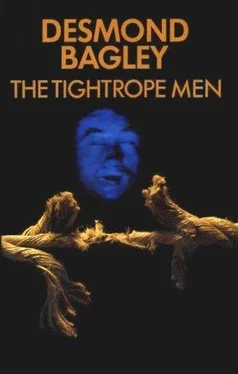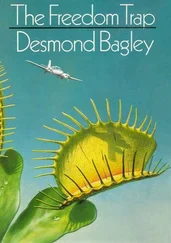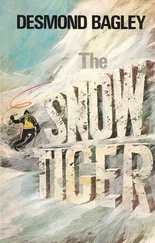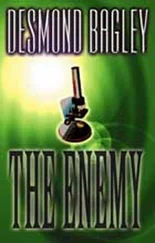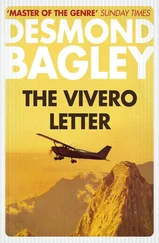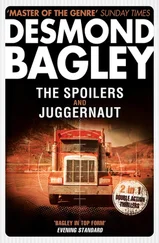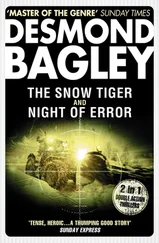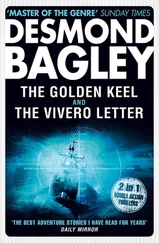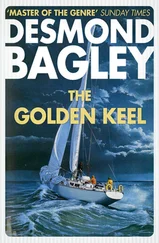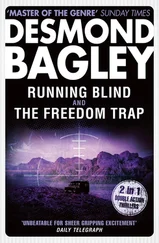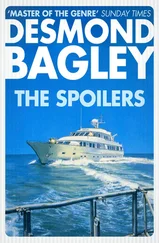Desmond Bagley - The Tightrope Men
Здесь есть возможность читать онлайн «Desmond Bagley - The Tightrope Men» — ознакомительный отрывок электронной книги совершенно бесплатно, а после прочтения отрывка купить полную версию. В некоторых случаях можно слушать аудио, скачать через торрент в формате fb2 и присутствует краткое содержание. Город: London, Год выпуска: 1973, ISBN: 1973, Издательство: HarperCollins, Жанр: Прочие приключения, на английском языке. Описание произведения, (предисловие) а так же отзывы посетителей доступны на портале библиотеки ЛибКат.
- Название:The Tightrope Men
- Автор:
- Издательство:HarperCollins
- Жанр:
- Год:1973
- Город:London
- ISBN:978-0-00-221847-4
- Рейтинг книги:4 / 5. Голосов: 1
-
Избранное:Добавить в избранное
- Отзывы:
-
Ваша оценка:
- 80
- 1
- 2
- 3
- 4
- 5
The Tightrope Men: краткое содержание, описание и аннотация
Предлагаем к чтению аннотацию, описание, краткое содержание или предисловие (зависит от того, что написал сам автор книги «The Tightrope Men»). Если вы не нашли необходимую информацию о книге — напишите в комментариях, мы постараемся отыскать её.
The Tightrope Men — читать онлайн ознакомительный отрывок
Ниже представлен текст книги, разбитый по страницам. Система сохранения места последней прочитанной страницы, позволяет с удобством читать онлайн бесплатно книгу «The Tightrope Men», без необходимости каждый раз заново искать на чём Вы остановились. Поставьте закладку, и сможете в любой момент перейти на страницу, на которой закончили чтение.
Интервал:
Закладка:
‘Yes,’ said Armstrong. ‘What’s the trouble?’
‘There’s a bit of an argument about policy going on back home and Thornton is pushing a bit too hard. It’s nothing that should concern you as long as you obey orders — my orders. If Thornton tries to order you around refer him to me.’
‘All right,’ said Armstrong.
‘I’ll tell you something about Thornton,’ said Carey candidly. ‘He’s a bastrich — that’s a word worthy of Lewis Carroll. It means a combination of a bastard and a son of a bitch. So you don’t say a word about this operation in Thornton’s presence. That’s another order from me.’
‘Not even if he asks me directly?’
‘Refer him to me,’ said Carey. ‘And you won’t get into trouble. I know he’s high-powered and you are but an underling, but you are in a different department. If he tries anything on just tell him to go to hell in a polite way, and I’ll back you up.’ He smiled. ‘And Lyng will back me so you have support all the way to the top.’
Armstrong looked relieved. ‘That’s clear enough.’
Carey nodded shortly. ‘Good. You attend to Thornton. I’ll see the boffin.’
The man whom Carey called the boffin was Sir Charles Hastings, F.R.S., a physicist not without eminence. Carey, whose opinion of scientists was low, treated him robustly and with a lack of deference which Sir Charles, who had a sense of humour, found refreshing. Carey now, on entering the room, said, “What’s the score?’
Sir Charles picked up a set of papers. ‘The answer is unequivocal. This is the crucial document. In it Dr Merikken outlines the germ of an idea, and develops it in a most interesting way. As you may know, the concept of the grazing angle has been utilized in the X-ray telescopes we now use, but Merikken took the idea much farther — which is strange considering he worked so many years ago.’
Sir Charles paused, contemplating a vision of genius. ‘Merikken not only worked out the theory but subjected it to tests in the laboratory — the only way, of course. Here is a list of his tests, the results of which are frankly astounding. In his first test he was able to obtain an X-ray reflectance of nearly 25 per cent of the incident illumination.’
‘Hold on a minute,’ said Carey. ‘How does that compare with what we’ve been able to do up to now?’
Sir Charles laughed shortly. ‘There’s absolutely no comparison. Apart from anything else, this is going to revolutionize X-ray astronomy; it makes possible an X-ray lens of considerable resolution. But that was just the first of Merikken’s tests; in his final test before he ended the series he’d done considerably better than that — and his apparatus was not up to modern standards.’
Carey felt his hands empty and took out his pipe. ‘So if we put a team on to this, gave it a hell of a lot of money and a reasonable amount of time, we could improve on what Merikken did. Would you agree with that, Sir Charles?’
‘Indeed I would. There’s nothing in here that offends any of the laws of physics. It reduces itself to a matter of engineering — advanced engineering, mark you, but nothing more than that.’ He spread his hands. ‘The X-ray laser has now moved from the barely possible to the probable.’
Carey gestured with his pipe. ‘Anything else of value in those papers?’
Sir Charles shook his head. ‘Nothing at all. This, for instance—’ he picked up the hardbound exercise book — ‘...this is a series of calculations of nuclear cross-sections. Quite primitive and totally useless.’ His voice was a trifle disparaging. ‘All the rest is the same.’
‘Thank you, Sir Charles.’ Carey hesitated. ‘I’d be obliged if you would stay in this room until I return. I don’t think I’ll be more than a few minutes.’ He ignored Sir Charles’s expression of polite surprise and left the room.
Outside the library he paused and squared his shoulders before opening the door. Thornton was lounging in a leather chair and Armstrong stood at the window. Armstrong looked harassed and was visibly relieved when he saw Carey. ‘Good morning,’ said Thornton. His voice was cheerful. ‘I must say you have your staff well trained, Carey. Mr Armstrong is a positive oyster.’
‘Morning,’ said Carey curtly.
‘I just popped in to find out how Sir Charles Hastings is doing. You must know we’re all very keen to see the results of your labours.’
Carey sat down, wondering how Thornton knew about Sir Charles. More and more he was certain there was a leak in Lyng’s office. He said blandly, ‘You’ll have to get that from Sir William Lyng.’
Thornton’s cheerfulness diminished a shade. ‘Well, I’m sure we can excuse Mr Armstrong while we have a discussion on that matter.’ He turned to Armstrong. ‘If you don’t mind.’
Armstrong made as though to move to the door but stopped as Carey snapped, ‘Stay where you are, Ian.’
Thornton frowned. ‘As you know, there are certain... er... details which Mr Armstrong is not entitled to know.’
‘He stays,’ said Carey flatly. ‘I want a witness.’
‘A witness!’ Thornton’s eyebrows rose.
‘Come off it,’ said Carey. ‘When this operation is finished I make out a final report — including what I hear in this room. So does Armstrong — independently. Got the picture?’
‘I can’t agree to that,’ said Thornton stiffly.
‘Then you don’t have to talk. What you don’t say Armstrong can’t hear.’ Carey smiled pleasantly. ‘What time is your plane back to London?’
‘I must say you’re not making things easy,’ said Thornton querulously.
Carey was blunt. ‘It’s not my intention to make things easy. You’ve been getting underfoot all through this operation. I haven’t liked that and neither has Lyng.’
All cheerfulness had deserted Thornton. ‘I think you misunderstood your position, Carey,’ he said. ‘You’re not yet so big that you can’t be knocked over. When the Minister reads my report I think you’ll be in for a shock.’
Carey shrugged. ‘You make your report and I’ll make mine. As for the Minister I wouldn’t know. I don’t rub shoulders with the Cabinet — I leave that to Lyng.’
Thornton stood up. ‘After this is over Lyng may not be around. I wouldn’t rely on him to protect you.’
‘Lyng can fight his own battles,’ said Carey. ‘He’s been very good at it so far. Ian, will you escort Mr Thornton to his car. I don’t think he has anything more to say.’
‘Just one small item,’ said Thornton. ‘There are, of course, people other than those in your department who have been involved. You had better make sure that Denison and the Meyrick girl are silenced. That’s all I have to say.’
He stalked out, followed by Armstrong. Carey sighed and took out his matches to light his pipe but stared at it in disgust and put it down unlit. Presently he heard a car door slam and the sound of tyres on gravel. When Armstrong came back he said, ‘He’s gone?’
‘Yes.’
‘Then give me a cigarette, for God’s sake!’
Armstrong looked surprised but produced a packet of cigarettes. As he held a match for Carey, he said, ‘You were a bit rough on Thornton, weren’t you?’
Carey puffed inexpertly, and coughed. ‘It’s the only way to handle a bastard like that. He’s the biggest con man in Whitehall, but if you hit him over the head hard enough he gets the message.’
‘I’m surprised he took it from you. Aren’t you afraid he’ll jerk the rug from under you? I thought he was a big boy in the corridors of power.’
‘Corridors of power!’ Carey looked as though he was about to spit. ‘I wonder if C. P. Snow knew he was coining the cliché of the twentieth century. I’m not afraid of Thornton; he can’t get at me directly. Anyway, I’m coming up to retirement and I’ll spit in his eye any time I feel like it.’
Читать дальшеИнтервал:
Закладка:
Похожие книги на «The Tightrope Men»
Представляем Вашему вниманию похожие книги на «The Tightrope Men» списком для выбора. Мы отобрали схожую по названию и смыслу литературу в надежде предоставить читателям больше вариантов отыскать новые, интересные, ещё непрочитанные произведения.
Обсуждение, отзывы о книге «The Tightrope Men» и просто собственные мнения читателей. Оставьте ваши комментарии, напишите, что Вы думаете о произведении, его смысле или главных героях. Укажите что конкретно понравилось, а что нет, и почему Вы так считаете.
